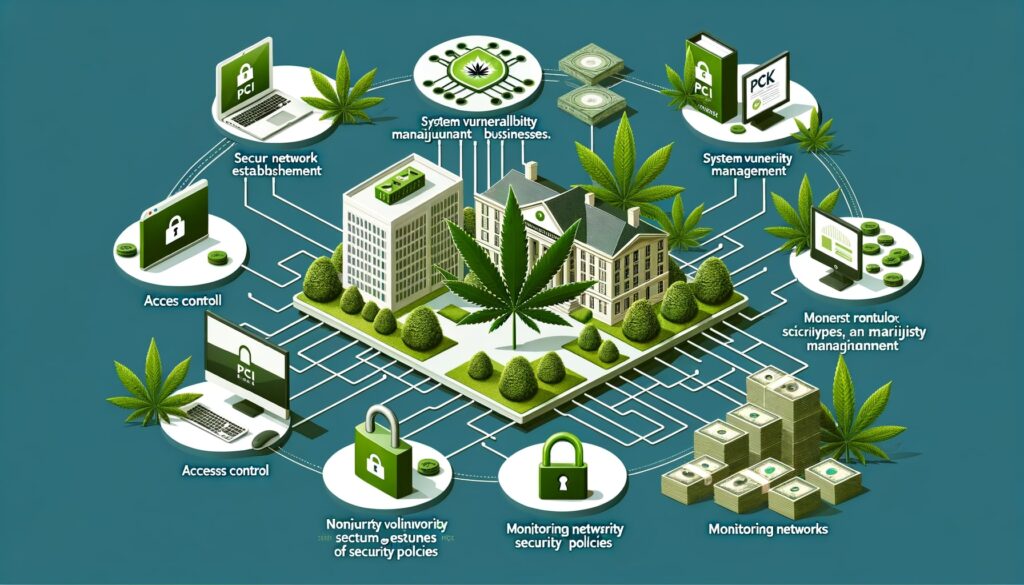
By Karen Henriques October 14, 2024
In recent years, the marijuana industry has experienced significant growth and legalization in various parts of the world. With this growth comes the need for marijuana businesses to comply with various regulations and standards, including Payment Card Industry Data Security Standard (PCI DSS) compliance. PCI compliance is crucial for any business that accepts credit card payments, as it ensures the security of cardholder data and protects both the business and its customers from potential data breaches and fraud.
PCI compliance is especially important for marijuana businesses, as they operate in a highly regulated industry. These businesses face unique challenges when it comes to maintaining compliance, given the legal complexities and stigma associated with the marijuana industry.
This comprehensive guide will provide marijuana businesses with a complete understanding of PCI compliance, its requirements, steps to achieve compliance, best practices for maintaining compliance, common challenges and solutions, and the importance of PCI compliance audits and assessments.
PCI Compliance Requirements for Marijuana Businesses

PCI compliance requirements are designed to ensure the security of cardholder data and protect businesses from potential data breaches. For marijuana businesses, these requirements are particularly important due to the sensitive nature of the industry. The following are the key PCI compliance requirements that marijuana businesses must adhere to:
- Build and Maintain a Secure Network: Marijuana businesses must install and maintain a firewall configuration to protect cardholder data. They should also change default passwords and security settings to ensure the security of their network.
- Protect Cardholder Data: Marijuana businesses must encrypt cardholder data during transmission and storage. This can be achieved by using secure protocols such as SSL/TLS and implementing strong encryption algorithms.
- Maintain a Vulnerability Management Program: Regularly update and patch systems and applications to protect against known vulnerabilities. Marijuana businesses should also conduct regular vulnerability scans and penetration tests to identify and address any potential weaknesses in their systems.
- Implement Strong Access Control Measures: Restrict access to cardholder data by implementing unique user IDs, strong passwords, and two-factor authentication. Limit physical access to cardholder data and ensure that only authorized personnel have access to sensitive information.
- Regularly Monitor and Test Networks: Implement a system for monitoring and logging all access to cardholder data. Regularly test security systems and processes to ensure their effectiveness and identify any potential vulnerabilities.
- Maintain an Information Security Policy: Develop and maintain a comprehensive information security policy that addresses all aspects of PCI compliance. This policy should be communicated to all employees and regularly reviewed and updated as needed.
Steps to Achieve PCI Compliance for Marijuana Businesses

Achieving PCI compliance can be a complex process, but it is essential for marijuana businesses to protect themselves and their customers. The following steps outline the process of achieving PCI compliance for marijuana businesses:
- Determine Your Merchant Level: Marijuana businesses must first determine their merchant level, which is based on the number of credit card transactions they process annually. The merchant level determines the specific requirements and validation methods they need to follow.
- Understand the PCI DSS Requirements: Familiarize yourself with the PCI DSS requirements outlined by the Payment Card Industry Security Standards Council (PCI SSC). These requirements provide a framework for securing cardholder data and maintaining compliance.
- Conduct a Self-Assessment Questionnaire (SAQ): Depending on your merchant level, you may be required to complete a self-assessment questionnaire (SAQ). The SAQ helps businesses assess their compliance with the PCI DSS requirements and identify any areas that need improvement.
- Implement Necessary Security Measures: Based on the results of the SAQ, marijuana businesses should implement the necessary security measures to address any identified vulnerabilities or gaps in compliance. This may include implementing firewalls, encryption, access controls, and other security measures.
- Engage a Qualified Security Assessor (QSA): Depending on your merchant level, you may be required to engage a qualified security assessor (QSA) to conduct a formal assessment of your compliance. A QSA is an independent third-party organization that is certified by the PCI SSC to assess compliance with the PCI DSS requirements.
- Submit Compliance Reports: Once you have completed the necessary steps to achieve compliance, you will need to submit compliance reports to your acquiring bank or payment processor. These reports demonstrate your compliance with the PCI DSS requirements and may include the SAQ, evidence of security measures implemented, and any other required documentation.
- Maintain Ongoing Compliance: Achieving PCI compliance is not a one-time event but an ongoing process. Marijuana businesses must continuously monitor and update their security measures, conduct regular vulnerability scans and penetration tests, and stay up to date with any changes to the PCI DSS requirements.
Best Practices for Maintaining PCI Compliance in the Marijuana Industry

Maintaining PCI compliance in the marijuana industry can be challenging due to the unique nature of the business and the legal complexities involved. However, by following best practices, marijuana businesses can ensure the security of cardholder data and maintain compliance with the PCI DSS requirements. The following are some best practices for maintaining PCI compliance in the marijuana industry:
- Educate Employees: Provide comprehensive training to all employees on the importance of PCI compliance and their role in maintaining compliance. This includes training on secure handling of cardholder data, password security, and recognizing and reporting potential security threats.
- Implement Strong Password Policies: Enforce strong password policies that require employees to use complex passwords and change them regularly. Implement two-factor authentication for accessing sensitive systems and data.
- Regularly Update and Patch Systems: Stay up to date with the latest security patches and updates for all systems and applications. Regularly test and apply these updates to protect against known vulnerabilities.
- Encrypt Cardholder Data: Implement strong encryption protocols to protect cardholder data during transmission and storage. Use SSL/TLS protocols for secure online transactions and ensure that sensitive data is encrypted when stored.
- Limit Access to Cardholder Data: Restrict access to cardholder data to only authorized personnel who need it to perform their job duties. Implement access controls, unique user IDs, and strong authentication mechanisms to prevent unauthorized access.
- Monitor and Log Access to Cardholder Data: Implement a system for monitoring and logging all access to cardholder data. Regularly review these logs to identify any suspicious activity or potential security breaches.
- Conduct Regular Vulnerability Scans and Penetration Tests: Regularly scan your systems and networks for vulnerabilities and conduct penetration tests to identify any weaknesses. Address any identified vulnerabilities promptly to maintain compliance.
- Develop an Incident Response Plan: Develop a comprehensive incident response plan that outlines the steps to be taken in the event of a security breach or data compromise. This plan should include procedures for notifying affected parties, investigating the breach, and implementing remediation measures.
- Engage a Qualified Security Assessor (QSA): Consider engaging a qualified security assessor (QSA) to conduct regular assessments of your compliance. A QSA can provide valuable insights and recommendations for maintaining compliance and addressing any identified vulnerabilities.
- Stay Up to Date with Industry Changes: Stay informed about any changes to the PCI DSS requirements and industry best practices. Regularly review and update your security measures to align with the latest standards and guidelines.
Common Challenges and Solutions for PCI Compliance in the Marijuana Industry

The marijuana industry faces unique challenges when it comes to maintaining PCI compliance. These challenges stem from the legal complexities and stigma associated with the industry. However, with careful planning and implementation of appropriate solutions, marijuana businesses can overcome these challenges and maintain compliance. The following are some common challenges faced by marijuana businesses and potential solutions:
- Cash-Only Transactions: Due to the legal restrictions and limited banking options for marijuana businesses, many operate on a cash-only basis. This poses a challenge for PCI compliance, as cash transactions do not involve the use of credit card data. However, marijuana businesses can still implement security measures to protect customer information, such as encrypting customer data stored in their systems and implementing strong access controls.
- Regulatory Compliance: Marijuana businesses must comply with various regulations and standards in addition to PCI DSS. These regulations may vary depending on the jurisdiction in which the business operates. To address this challenge, marijuana businesses should develop a comprehensive compliance program that includes all relevant regulations and standards. This program should be regularly reviewed and updated to ensure ongoing compliance.
- Limited Banking Options: Many financial institutions are hesitant to provide banking services to marijuana businesses due to the legal complexities and federal regulations surrounding the industry. This can make it challenging for marijuana businesses to find a payment processor that is willing to work with them. To overcome this challenge, marijuana businesses should conduct thorough research to identify payment processors that specialize in serving the marijuana industry and are knowledgeable about the unique compliance requirements.
- Stigma and Perception: The marijuana industry still faces stigma and negative perception in many parts of the world. This can make it challenging for marijuana businesses to gain trust and credibility, especially when it comes to handling sensitive customer data. To address this challenge, marijuana businesses should prioritize transparency and security in their operations. Implementing robust security measures, regularly communicating with customers about data protection practices, and obtaining third-party certifications can help build trust and credibility.
- Employee Training and Awareness: Employee training and awareness are crucial for maintaining PCI compliance. However, in the marijuana industry, where turnover rates can be high and employees may have limited experience with compliance requirements, training can be a challenge. To overcome this challenge, marijuana businesses should develop comprehensive training programs that cover the basics of PCI compliance, the importance of data security, and the specific requirements for their business. Regularly reinforce training through ongoing education and awareness initiatives.
- Third-Party Service Providers: Many marijuana businesses rely on third-party service providers for various aspects of their operations, such as point-of-sale systems, e-commerce platforms, and payment processors. However, these third-party providers may not always be PCI compliant, which can pose a risk to the marijuana business. To address this challenge, marijuana businesses should conduct due diligence when selecting third-party providers and ensure that they have appropriate security measures in place. Regularly review and monitor the compliance status of these providers to ensure ongoing compliance.
PCI Compliance Audits and Assessments for Marijuana Businesses

PCI compliance audits and assessments are an essential part of maintaining compliance for marijuana businesses. These audits and assessments help businesses identify any gaps in their compliance and ensure that they are following the necessary security measures to protect cardholder data. The following are the key aspects of PCI compliance audits and assessments for marijuana businesses:
- Qualified Security Assessor (QSA) Assessments: Depending on their merchant level, marijuana businesses may be required to engage a qualified security assessor (QSA) to conduct a formal assessment of their compliance. A QSA is an independent third-party organization that is certified by the PCI SSC to assess compliance with the PCI DSS requirements. The QSA will review the business’s security measures, policies, and procedures, and provide a detailed report on their compliance status.
- Self-Assessment Questionnaires (SAQs): Marijuana businesses that are not required to engage a QSA can complete a self-assessment questionnaire (SAQ) to assess their compliance. The SAQ helps businesses evaluate their compliance with the PCI DSS requirements and identify any areas that need improvement. There are different types of SAQs available, depending on the specific requirements of the business.
- Internal Audits: In addition to external audits and assessments, marijuana businesses should conduct regular internal audits to ensure ongoing compliance. Internal audits involve reviewing the business’s security measures, policies, and procedures to identify any gaps or weaknesses. These audits can be conducted by an internal compliance team or by engaging a third-party auditor.
- Penetration Testing: Penetration testing is a critical component of PCI compliance audits and assessments. It involves simulating real-world attacks on the business’s systems and networks to identify any vulnerabilities or weaknesses. Penetration testing should be conducted by qualified professionals who have expertise in identifying and exploiting security vulnerabilities.
- Remediation and Follow-Up: Once the audit or assessment is complete, marijuana businesses must address any identified vulnerabilities or gaps in compliance. This may involve implementing additional security measures, updating policies and procedures, or providing additional training to employees. Regular follow-up audits and assessments should be conducted to ensure that the necessary remediation measures have been implemented and that ongoing compliance is maintained.
Frequently Asked Questions (FAQs) about PCI Compliance for Marijuana Businesses
Q1. What is PCI compliance, and why is it important for marijuana businesses?
PCI compliance refers to the adherence to the Payment Card Industry Data Security Standard (PCI DSS), which is a set of security requirements designed to protect cardholder data. PCI compliance is important for marijuana businesses that accept credit card payments as it ensures the security of customer data and protects the business from potential data breaches and fraud.
Q2. What are the key PCI compliance requirements for marijuana businesses?
The key PCI compliance requirements for marijuana businesses include building and maintaining a secure network, protecting cardholder data through encryption, implementing a vulnerability management program, implementing strong access control measures, regularly monitoring and testing networks, and maintaining an information security policy.
Q3. How can marijuana businesses achieve PCI compliance?
Marijuana businesses can achieve PCI compliance by determining their merchant level, understanding the PCI DSS requirements, conducting a self-assessment questionnaire (SAQ), implementing necessary security measures, engaging a qualified security assessor (QSA) if required, submitting compliance reports to their acquiring bank or payment processor, and maintaining ongoing compliance through regular monitoring and updates.
Q4. What are some best practices for maintaining PCI compliance in the marijuana industry?
Some best practices for maintaining PCI compliance in the marijuana industry include educating employees on the importance of compliance, implementing strong password policies, regularly updating and patching systems, encrypting cardholder data, limiting access to cardholder data, monitoring and logging access to cardholder data, conducting regular vulnerability scans and penetration tests, developing an incident response plan, engaging a qualified security assessor (QSA), and staying up to date with industry changes.
Q5. What are some common challenges faced by marijuana businesses in maintaining PCI compliance?
Some common challenges faced by marijuana businesses in maintaining PCI compliance include cash-only transactions, regulatory compliance, limited banking options, stigma and perception, employee training and awareness, and reliance on third-party service providers. These challenges can be overcome through careful planning, implementation of appropriate solutions, and ongoing monitoring and updates.
Conclusion
Achieving and maintaining PCI compliance is crucial for marijuana businesses to ensure the security and integrity of customer payment information. By understanding the requirements, following the steps to achieve compliance, implementing best practices, and addressing common challenges, marijuana businesses can create a secure environment for both customers and their own operations. Prioritizing PCI compliance not only helps businesses avoid penalties but also builds trust with customers and strengthens the overall security posture of the marijuana industry.